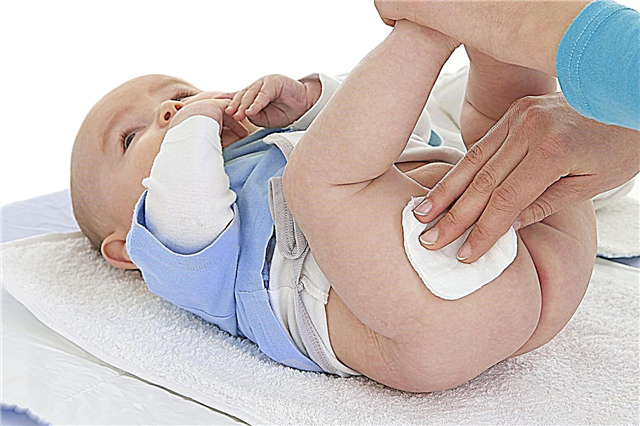Dads and mothers are often faced with the fact that the child has a hard stomach, which usually indicates bloating (flatulence). This very fact often worries parents, since they cannot independently understand how dangerous this sign is. In turn, it can act as a consequence of diseases and a normal state. If your child's bloating occurs at frequent intervals, it is strongly recommended that you see a doctor.

The baby suffers from flatulence
Symptoms
If a child has a swollen belly, this may or may not be indicative of digestive disorders. Flatulence is either spontaneous, caused by improper diet, or a manifestation of diseases of the gastrointestinal tract. If we are talking about ordinary intestinal colic in an infant, then this process is absolutely physiological in nature.

Baby before feeding
Concomitant symptoms are important diagnostic criteria:
- Feeling of heaviness in the abdomen.
- Difficulty falling asleep or too little sleep.
- The baby has a hard stomach and hurts.
- Reluctance to eat.
- Gases do not go well.
- Weakness.
- Decreased function of the digestive system.
- Diarrhea.
There may be hidden indicators of a bloated abdomen in a child, which only a doctor can determine.
How to recognize bloating
Intestinal colic in certain cases can last up to three months. They manifest themselves in the reddening of the baby's face, clenching of the fists, tapping the legs and the desire to press them to the stomach.

Bloated belly in a child
Loss of appetite is common. When a mother tries to give the baby a breast, a child under one year old can either refuse it altogether, or take just a few sips.
Intestinal colic occurs paroxysm, their duration is from three hours. They pass when all gases leave the baby's body.
In older children, flatulence manifests itself more calmly, but this condition can still be expressed in loss of appetite, bad mood and insomnia. Babies often complain of pain. In addition to a hard tummy, breathing difficulties can be experienced.
Causes of flatulence in a newborn
Why is the baby's belly swollen? When it comes to a newborn, the most common cause of bloating is intestinal colic. As a rule, they appear somewhere in the second or third week and last up to three months. This condition is not related to disease. It is caused by insufficient development of the digestive system.

Lay on stomach - effective relief for colic
The reason for colic can be that the mother does not follow a diet. During the first six months, her diet should be limited, because all the harmful substances enter the crumbs. The gastrointestinal tract in a child up to a month is not yet sufficiently formed to digest all this. Therefore, the belly may swell.

A parent helped an inflated child with colic
Mom is strictly prohibited from smoked, spicy and salty foods, carbonated drinks, citrus fruits, sweets, and legumes. All of them can lead to flatulence in an adult with a developed digestive system. What to say about the child?
Not all cases of colic are caused by the mother's eating behavior. Considering that the baby's gastrointestinal tract is still developing, colic will be in any case. It's just that mom's diet can alleviate or aggravate this condition. Bloating in babies can often occur in those who are bottle-fed.
Important! Before giving your child a formula, you need to make sure that it contains all the necessary trace elements in the correct proportions, as well as its health benefits.
Possible diseases
ATbloating can also indicate serious diseases, which include:
- Chronic diseases of the digestive system: gastritis, duodenitis, colitis and others.
- Acute respiratory viral infections. For example, with the flu, there may sometimes be bloating with diarrhea.
- Lactose intolerance. A very common reason why the belly can swell, which is especially dangerous during infancy.
- Intestinal infections. One of the most dangerous situations that can bloat a baby's belly.
- Appendicitis. This is one of the most dangerous conditions that makes the abdomen hard. It can kill a person in a few hours. Also, with appendicitis, there may be a temperature of 37-38 degrees.
First aid for colic
If a child has bloating, what to do in this situation? A baby will not be able to completely get rid of intestinal colic. And it is not necessary, since this is an absolutely normal phenomenon. But you can significantly ease the suffering of the baby. To do this, do:
- Tummy massage is carried out clockwise.
- Put the baby on his stomach.
- Tighten the baby's legs to the tummy.
- You can significantly reduce the pain syndrome by placing the baby with his stomach against the parent's stomach.
- Sing a lullaby or play "white noise" - a monotonous background sound (the noise of a waterfall, cars, rain, and so on).
It is also important to calm down yourself, because the negative emotional state of the parent is transmitted to the child. You can also feed in a different position or rock your baby. If none of the above methods work, a vent tube can be used.
When to see a doctor
At least once a month, you need to take the child to a doctor who will examine him and determine if everything is normal with him. Only a pediatrician can adequately determine the degree of danger of the condition, therefore, with the slightest doubt, a visit to it is mandatory.
For example, appendicitis can easily disguise itself as an intestinal infection. It also manifests itself in the fact that the child has a dense stomach, and the count can go on for hours. Therefore, for your own confidence, you need to consult a doctor immediately. When it becomes clear that this is normal colic, relax.
Important! It is strictly forbidden to self-medicate if the baby has a prolonged loss of appetite, vomiting, pallor.
Consequences of not being treated
It all depends on the cause that caused the colic. If we are talking about appendicitis or a severe intestinal infection, this can be fatal. If this is the usual colic characteristic of newborns, they go away on their own.
Important! Parents need to be careful, because sometimes the treatment prescribed by the doctor is excessive and results in loss of money. Therefore, adults should always have their own medical literacy. This does not mean that you need to refuse to visit doctors.
Prevention
Complete prevention of intestinal colic in an infant is impossible, but a series of actions wayyen significantly reduce their frequency and intensity:
- Apply the baby to the breast correctly. The baby should capture not only the nipple, but the entire areola.
- Overfeeding should not be allowed. You need to trust your child and focus solely on his appetite.
- After feeding, it is recommended to hold the baby in a "column" for 15 minutes.
- If the cause of colic is lactase deficiency, lactose-free mixtures should be used.
- Mom herself must eat right. Then the baby's belly will inflate less, he will cry less often.
If you follow these simple guidelines, your child will be much easier.
Intestinal colic is generally normal in infancy and should not be treated. In some cases, gas in an infant can indicate poisoning, this requires urgent treatment. Also, a hard stomach can be with appendicitis, which can kill a baby in a few hours. Therefore, at the first appearance of this symptom, it is recommended to immediately consult a doctor. The tummy can also get sick with other diseases of the digestive system.



